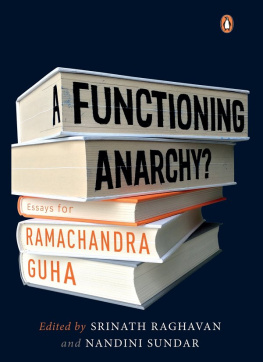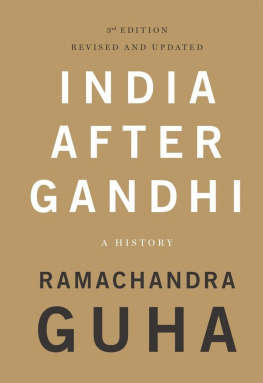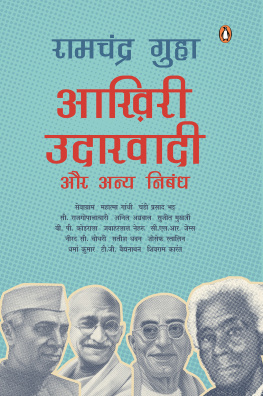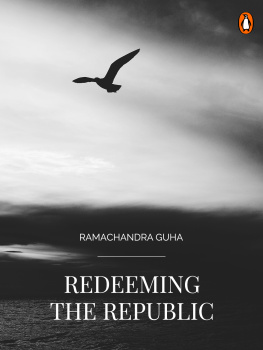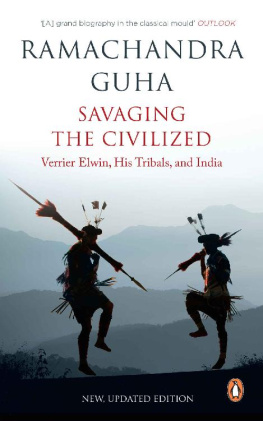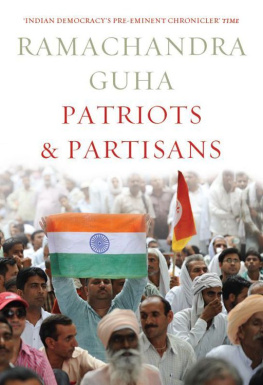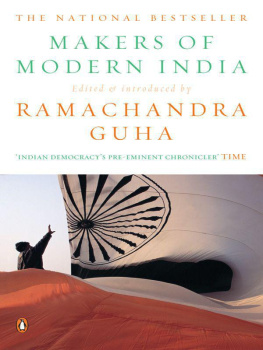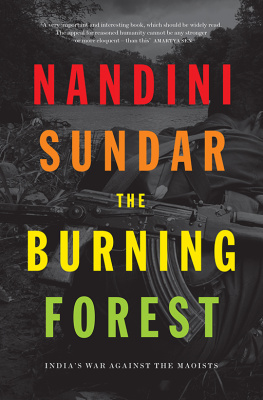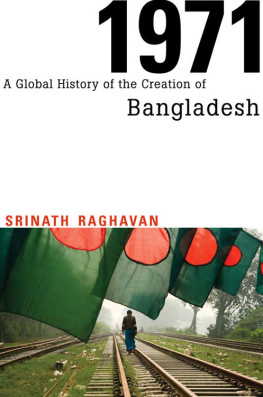Nandini Sundar and Srinath Raghavan (eds.) - A Functioning Anarchy?: Essays for Ramachandra Guha
Here you can read online Nandini Sundar and Srinath Raghavan (eds.) - A Functioning Anarchy?: Essays for Ramachandra Guha full text of the book (entire story) in english for free. Download pdf and epub, get meaning, cover and reviews about this ebook. year: 2021, publisher: Penguin, genre: Politics. Description of the work, (preface) as well as reviews are available. Best literature library LitArk.com created for fans of good reading and offers a wide selection of genres:
Romance novel
Science fiction
Adventure
Detective
Science
History
Home and family
Prose
Art
Politics
Computer
Non-fiction
Religion
Business
Children
Humor
Choose a favorite category and find really read worthwhile books. Enjoy immersion in the world of imagination, feel the emotions of the characters or learn something new for yourself, make an fascinating discovery.
- Book:A Functioning Anarchy?: Essays for Ramachandra Guha
- Author:
- Publisher:Penguin
- Genre:
- Year:2021
- Rating:3 / 5
- Favourites:Add to favourites
- Your mark:
- 60
- 1
- 2
- 3
- 4
- 5
A Functioning Anarchy?: Essays for Ramachandra Guha: summary, description and annotation
We offer to read an annotation, description, summary or preface (depends on what the author of the book "A Functioning Anarchy?: Essays for Ramachandra Guha" wrote himself). If you haven't found the necessary information about the book — write in the comments, we will try to find it.
A Functioning Anarchy?: Essays for Ramachandra Guha — read online for free the complete book (whole text) full work
Below is the text of the book, divided by pages. System saving the place of the last page read, allows you to conveniently read the book "A Functioning Anarchy?: Essays for Ramachandra Guha" online for free, without having to search again every time where you left off. Put a bookmark, and you can go to the page where you finished reading at any time.
Font size:
Interval:
Bookmark:



PENGUIN BOOKS

PENGUIN BOOKS
NANDINI SUNDAR AND SRINATH RAGHAVAN
SOME FIFTY YEARS ago, the eminent economist and US envoy John Kenneth Galbraith famously described India as a functioning anarchy. Galbraiths comments captured both the fascination and frustration with which observers around the world, including in India, saw the countrys efforts at economic development within the framework of a fully fledged as in his book India after Gandhi, published in 2007 on the sixtieth anniversary of Indias Independence, where he calls India a 50-50 democracy. However, in doing so, Guha is clearly voicing a cautious optimism.
Currently, the robustness of Indias democracy seems more precariously poised than ever before, not excepting the infamous years of the Emergency, with authoritarian and even fascist tendencies becoming dominant in society as well as the state. Yet, as the winter of 201920 shows us, with its protests against the Citizenship (Amendment) Act (CAA) and National Register of Citizens (NRC), significant numbers of Indians are deeply invested in the secular and egalitarian principles of the Constitution. Among the memorable images of the protests was one of Ramachandra Guha being dragged away by the police mid-sentence while giving an interview to a television channel against the CAA.
If Ramachandra Guha has been one of the most public and outspoken defenders of Indian democracy, he has also been one of its foremost scholars and chroniclers. In a long and versatile career spanning thirty-five years, Guha has produced a series of remarkable studies that have approached this issue from several vantage points. In each of these, Guha has broken new ground: his pioneering environmental histories of India, both alone and with distinguished scholars like Madhav Gadgil and Joan Martinez-Alier; his social histories of Indian cricket; his monumental history of the Indian republic; his biographies of Verrier Elwin and Gandhi; his anthologies of ecological, social and political thought in India; and his collections of biographical and political essays.
Guhas originality as a scholar has been matched by the accessibility of his writings, both as a historian and columnist. In consequence, he is also one of Indias most admired (and at times most reviled) public intellectuals. Insofar as Twitter is any indicator,
Guha once published an essay titled The Last Liberal, yet his own oeuvre they have also been on the same side.
Another emblematic kerfuffle is an article Guha wrote in the Indian Express in 2018, Liberals, Sadly, where he argued that Indias liberals must take on both Hindu and Muslim communalists.
In focusing on the trenches of such controversial debates, we risk losing sight of the vast hinterland of scholarship and research that Guha has opened up to a large non-specialist audience. The serious historian as a paperback writer is a rare bird in the Indian landscape. Lucidity and elegance in writing is not always considered a virtue, especially in certain quarters of academia where obscurity and turgidity masquerade as intellectual depth and profundity. Guha took his scholarly bearings, however, from historians like E.P. Thompson and Marc Bloch, who aimed their path-breaking research and writing at the educated, general reader. The defining characteristics of Guhas scholarship have been the desire to consistently break new ground and to reach ever wider circles of readership. No Indian historian has succeeded comparably in taking serious history to the laity. What is more, unlike some celebrity historians in the west, Guha has done so without having to tailor his books to the demands of a television series or of streaming platforms. This is not the place to list his numerous scholarly accomplishments and recognitions, but it is perhaps worth pointing out the intellectual company he keeps. In 2019, the American Historical Association made him an Honorary Foreign Member, a recognition accorded to only two other Indian historians so farJadunath Sarkar (1952), and Romila Thapar (2009). This recognition also places him in the select league of outstanding non-American historians of earlier generations such as Eric Hobsbawm, Joseph Needham or Fernand Braudel. And it is his scholarship and research that this book celebratesthe broad canvas, the copious footnotes, the analytic insights, and the judicious summing uprather than his occasionally exasperating but always readable articles in the popular press. The calmness and sobriety of his academic work is, in fact, a remarkable contrast to the passion and verve of his popular writing. Yet, one needs to keep all these qualities in mind to understand the peculiarities of Ramachandra Guha.
Born in 1958 in Dehradun where his chemist father, S.R. Guha, worked at the Forest Research Institute, and educated first at Cambrian Hall School where his mother taught geography, Hindi and economics, and then at the elite Doon School and St. Stephens College, Guha was quintessentially a child of Nehrus India. His parents were first cousins, themselves second- or third-generation professionals, members of an urban cosmopolitan Tamil family, with democratic instincts and a desire to do social work. Some members of the family were also notoriously fractious: for instance, the historian Dharma Kumar and the civil-servant-turned-economist S. Guhan stopped speaking to each other after public disagreements over affirmative action. While this may contextualize Ramachandra Guhas privilege, his liberalism, as well as his argumentative instincts, it does not, however, account for his particular set of varied interests, extraordinary productivity or generosity to younger scholars.
As a child, Guhas interests took him to the cricket field, birding (he wrote on birdwatching for the Doon school magazine), and the Himalayan forestinterests that followed him into his academic career. The greatest regret of his life, Guha has often said, was his failure to become a top-class cricketerone that he tried to compensate by writing first-class books on the history of cricket (Wickets in the East, and A Corner of a Foreign Field) and later by agreeing to serve on the board of a Supreme Court-mandated committee of administrators to clean up the Board of Control for Cricket in India (BCCI). As Suresh Menon remarks in his essay in this volume, it is perhaps because cricket or rather the art and craft of cricket has remained Guhas first love, that he is so proficient in the historical craft.
Guha tried all the traditional professions before he settled down as an independent historian. He took a year off after college to study for the civil services exam because his friends were doing so. Fortunately, he failed. Indeed, the succession of jobs that Guha did not join is revealinghe turned down an offer from the Times of India, a professorship at the Department of Sociology, Guhas various arguments and his passionate involvements in projects may betray a certain recklessness, but to charge him with the ability to undermine the morals of the countrys youth-power or ruin its world-best culture is perhaps an overestimation of his reach.
Font size:
Interval:
Bookmark:
Similar books «A Functioning Anarchy?: Essays for Ramachandra Guha»
Look at similar books to A Functioning Anarchy?: Essays for Ramachandra Guha. We have selected literature similar in name and meaning in the hope of providing readers with more options to find new, interesting, not yet read works.
Discussion, reviews of the book A Functioning Anarchy?: Essays for Ramachandra Guha and just readers' own opinions. Leave your comments, write what you think about the work, its meaning or the main characters. Specify what exactly you liked and what you didn't like, and why you think so.

